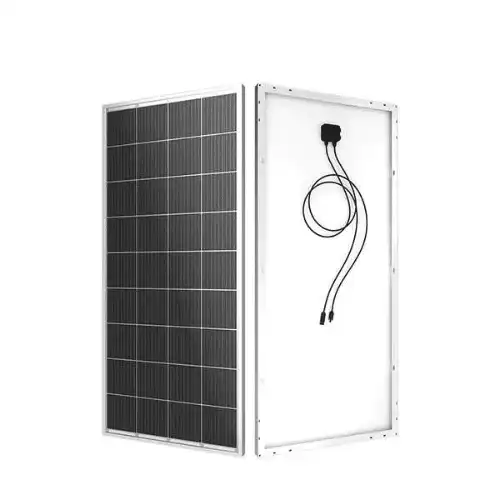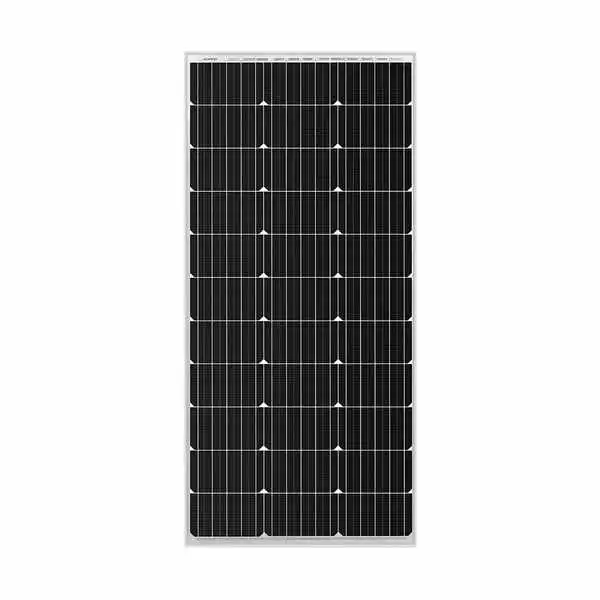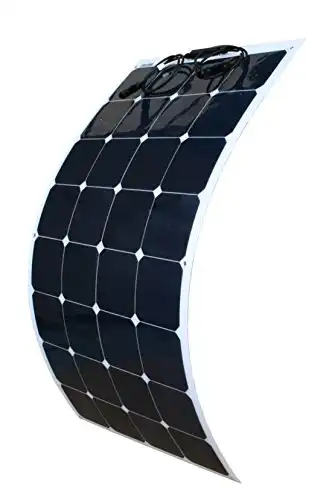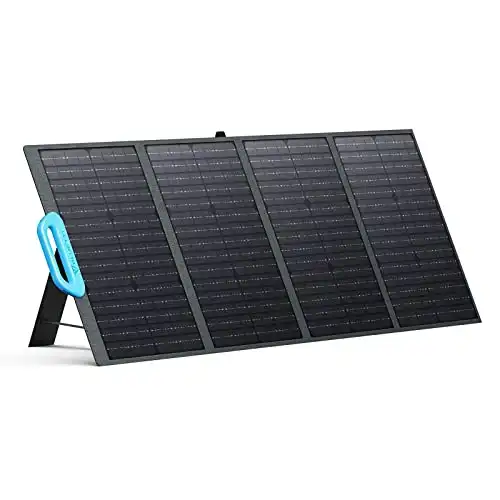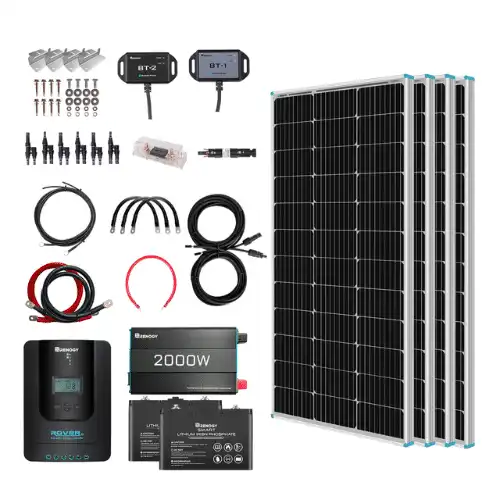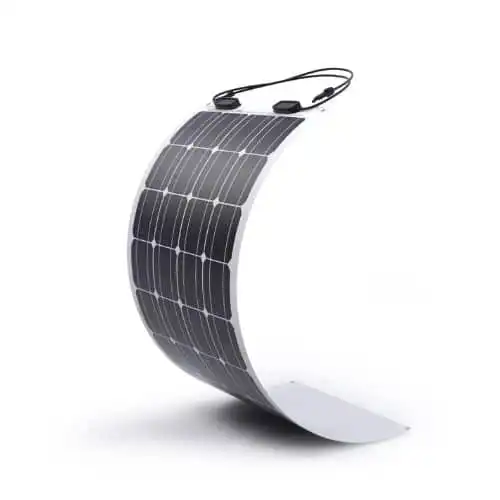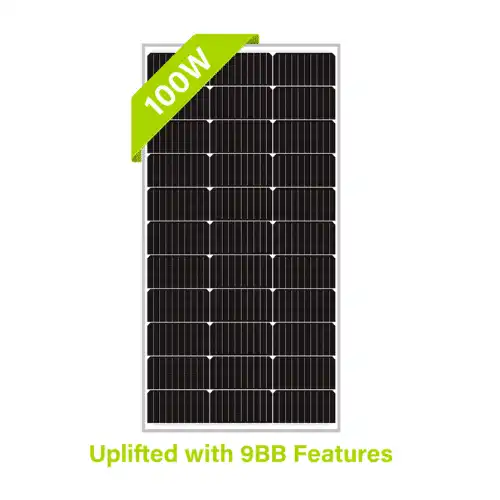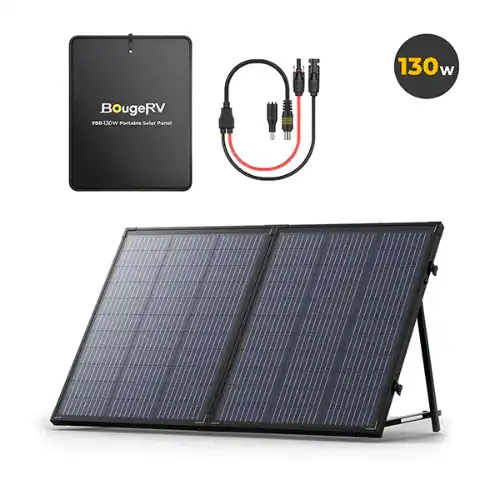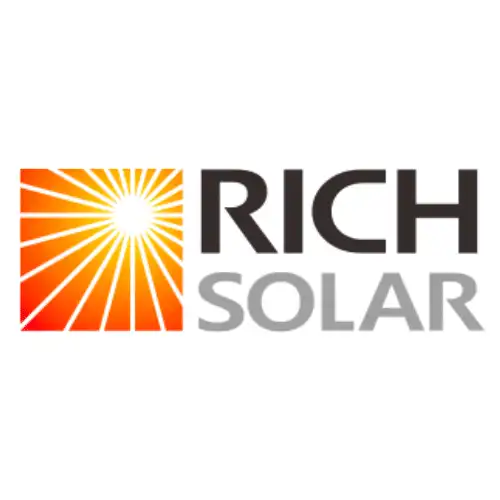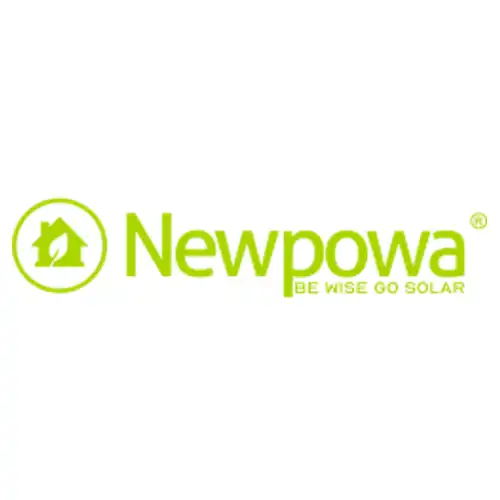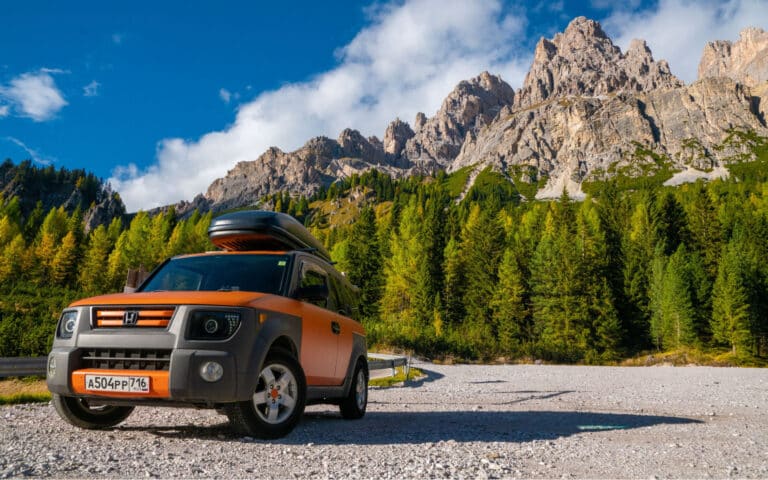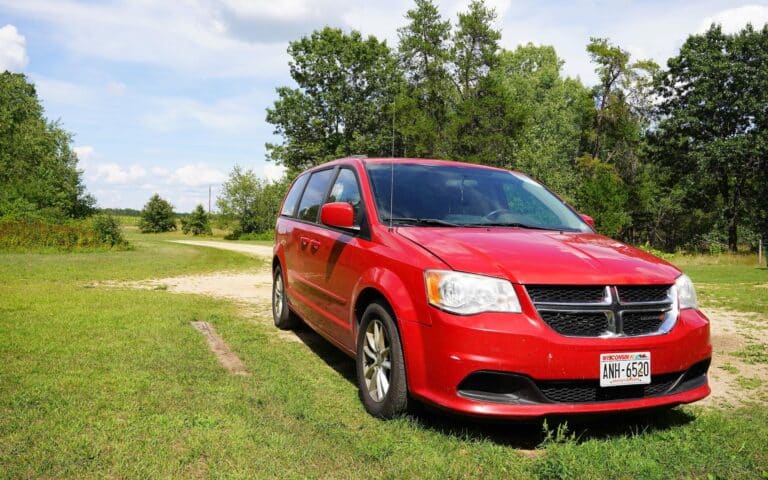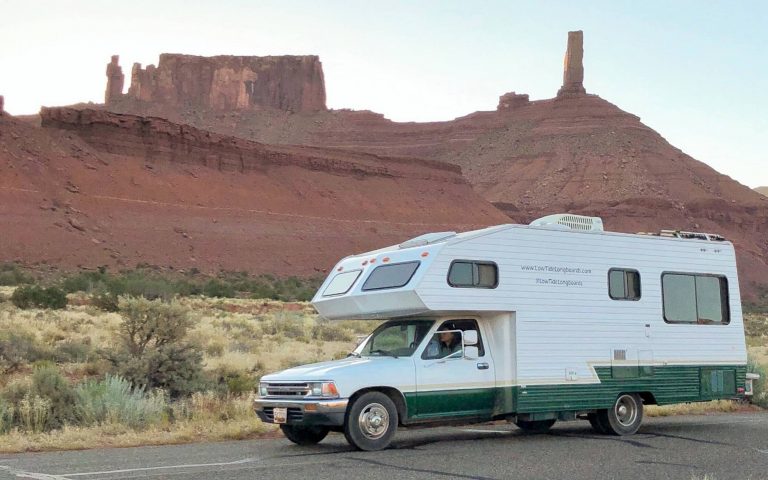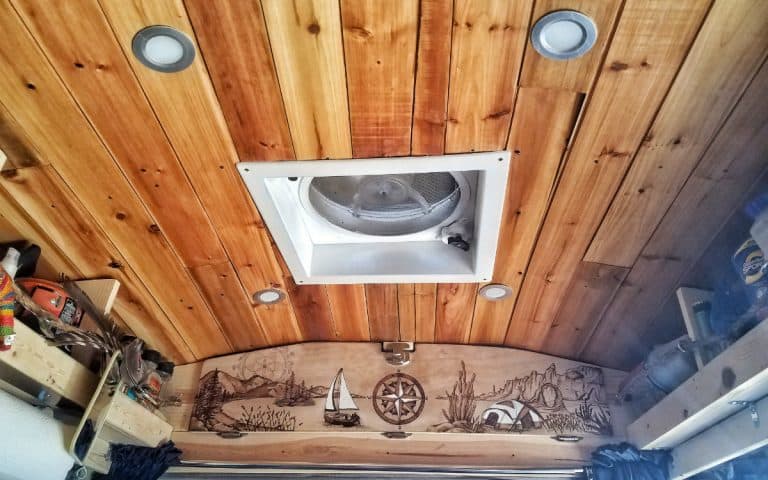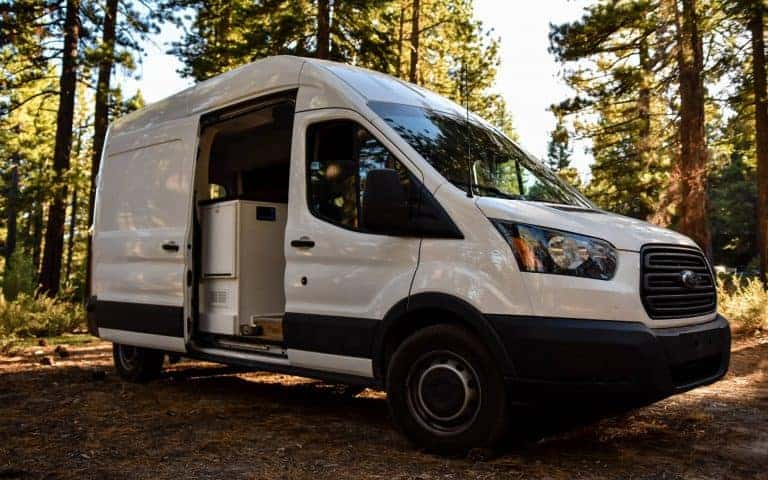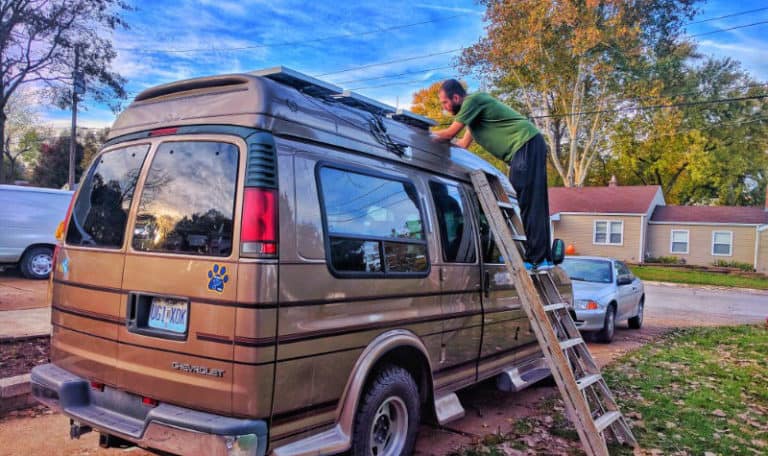If your #vanlife goals include camping off grid and enjoying the freedom of the open road, you need solar. Installing a full solar electrical system on your camper van or RV is a great way to stay connected and enjoy all the creature comforts you need for a nomadic lifestyle.
Any solar panels can help you power through van life. But the best campervan solar panels are highly efficient, cost-effective, and fit within the context of your specific van build.
In this epic guide, we dig into everything you need to know to choose the right solar panels for your rig. We discuss types of camper van solar panels, what to look out for when buying solar panels, and the best solar panels for different situations.
But first, here’s a quick rundown. After years living with off grid solar systems, installing solar panels on vans, and testing panels from various brands, these are our top recommendations for van conversion solar panels.
This post is adapted from our ebook Vanlife Solar Basics.
Are you tired of jumping from website to website trying to wrap your head around your van’s electrical system? Our comprehensive guide covers everything from fundamentals to components to sizing to installation, all in one easy-to-follow package.
Our Top Picks for Van Solar Panels
This high efficiency 9BB solar panel is less affected by shading and tilting, so you can squeeze the most power out of your van's roof space. Our top recommended solar panel.
Enter discount code Gnomad for 16% off at Bougerv.com
100W 9BB solar panel at an affordable cost per Watt. From Renogy, one of the best van life solar brands.
Enter discount code Gnomad8 for 8% off at Renogy.com
High efficiency, ETFE-coated flexible panels that are super bendable and outperform alternatives. Also available in a 175W size.
Enter discount code Gnomad8 for 8% off at Renogy.com
High quality portable solar panel that performs better than the off-brands at a better value than the big brands.
Everything you need to wire solar in your van. Includes 200Ah of self-heating LiFePO4 batteries (or AGM), 2000W pure sine inverter, wiring, connectors, and fuses.
Enter discount code Gnomad8 for 8% off at Renogy.com
Jump to the detailed roundup >>>
How to Choose the Best Solar Panels for Your Van Build
There are many things to think about when choosing the right RV solar panels for your van and your electrical needs. Let’s go over the most important, then we’ll dig into the details.
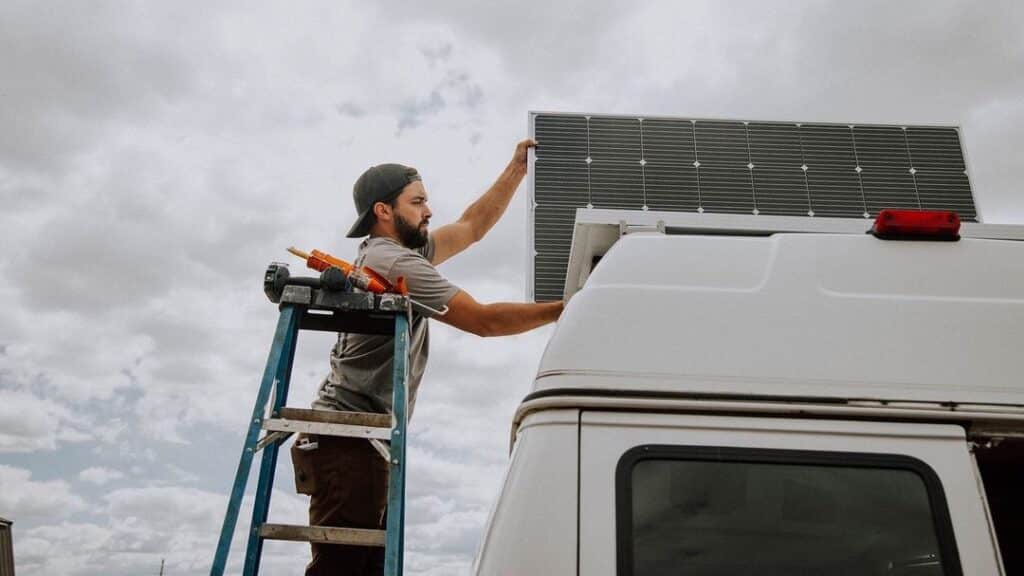
How many Watts of solar you need.
You’ll want enough solar to fully recharge your battery bank while accommodating your daily electrical usage.
You can get by with a 200W system if you have barebones power needs. But if you plan on running things like a 12V portable fridge, vent fan, and other appliances, 300W-400W of solar is a safer minimum. The more solar that you have, the better off you’ll be when you hit a string of cloudy weather or spend time in forested areas with lots of shade.
To get the most accurate number, size your system based on how much power you actually use (our campervan electrical guide has full instructions for this).
Solar panel dimensions and roof layout.
It’s a good idea to measure your van’s roof and plan your layout before selecting your solar panels.
Where is your vent fan going to go? Are you installing a roof rack or a storage box? How and where do solar panels fit into this picture?
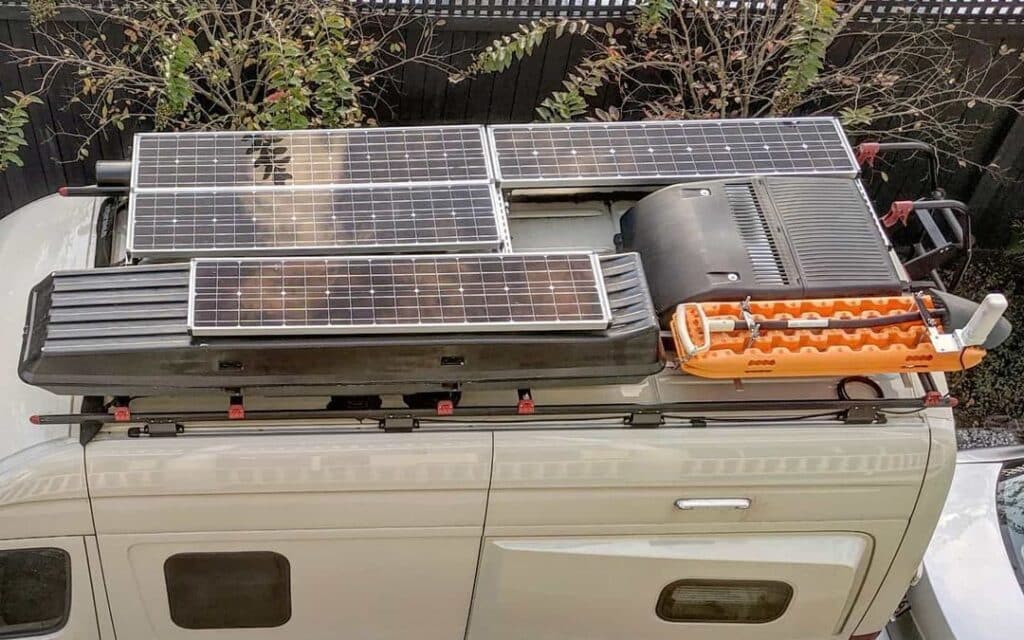
Solar panels come in many sizes. To build out a 400W solar system you can get 2 x 200W panels, or you can get 4 x 100W panels. And panels of the same Wattage may have different dimensions that can make one work better for your roof layout.
Check the dimensions to make sure the panels you’re considering will fit where you need them to go.
How will you mount your solar panels?
Is your van’s roof curved? Are you comfortable drilling holes in your roof? Are you planning to mount your panels on a roof rack?
Your answers to these questions will affect the type of solar panels you’ll want for your rig.
Flexible solar panels are easy to mount to curved surfaces and don’t require drilling holes, but they’re not very durable. You’ll need to drill holes to mount rigid panels (or mount them on a roof rack), but they’re cheaper and last far longer.
Is stealth important to you?
If you plan on stealth camping in cities, you want your van to be as inconspicuous as possible. A bunch of rigid panels that stick off your roof may not be the best solar panels for you (although you can conceal these somewhat with a roof rack).
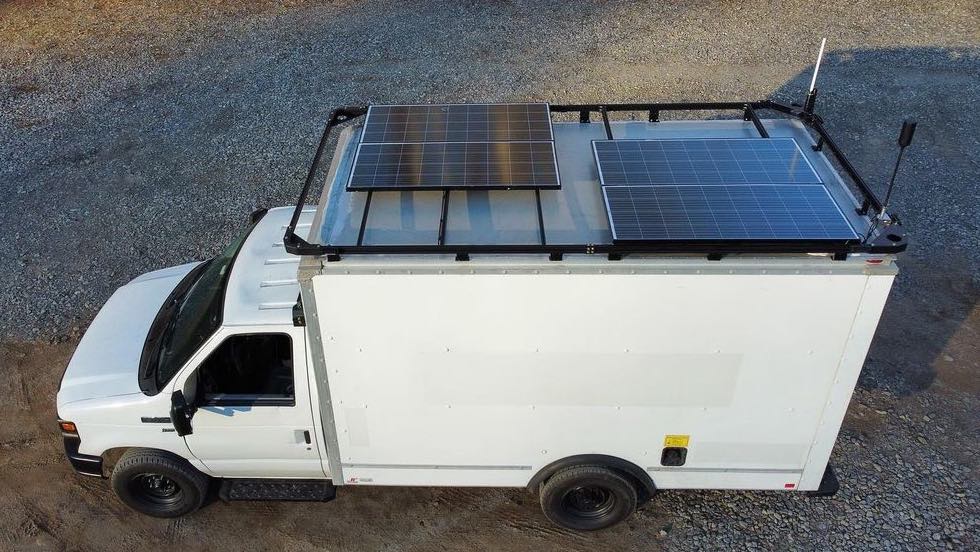
If stealth camping is a huge priority, flexible panels are a lot less obvious.
What’s your budget?
If budget is a concern, then you’re better off going with rigid panels, which are cheaper and last much longer than other types of solar panels.
Some rigid panels give you more bang-for-your-buck than others. It’s important to consider cost per watt when comparing the best campervan solar panels, and weigh that against other features like efficiency rating, warranty, and dimensions (we get into all of this below).
If you have other priorities (like ease of installation or stealth) and budget isn’t as much of a concern, then flexible camper solar panels could be a decent option.
Types of Camper Van Solar Panels
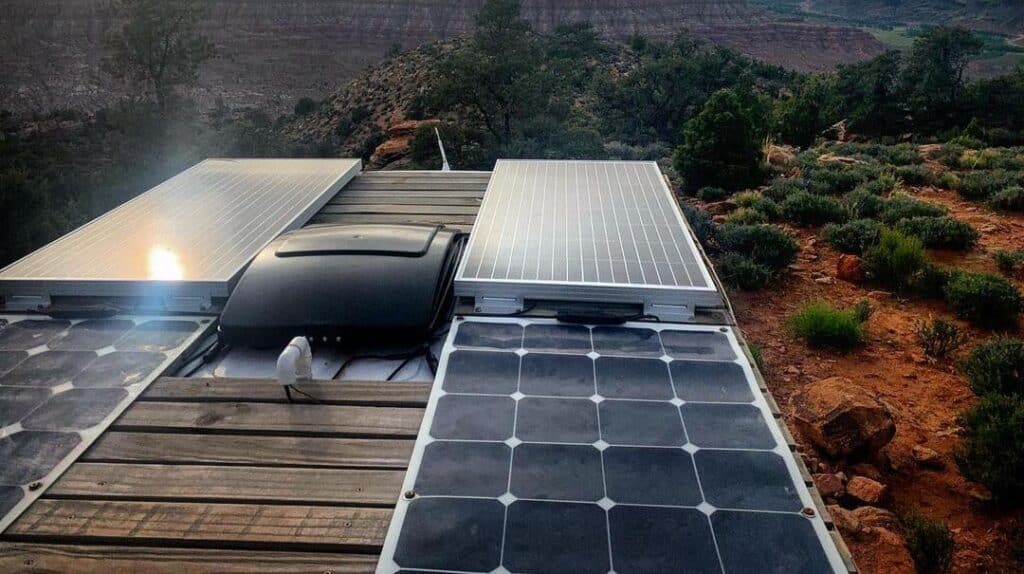
There are several types of solar panels to consider for your camper van conversion, from different photovoltaic cells to various form factors. Each has their own pros and cons, and which one is better for you depends on your rig and how you plan on using it.
The most common solar cell types are
- Monocrystalline solar panels. Mono panels are the most efficient. They’re also the most common, and make the most sense for van builds.
- Polycrystalline solar panels. Poly panels are less efficient, but cheaper.
- CIGS flexible solar panels. Durable and great in low-light environments, but very expensive.
The main solar panel form factors you’ll find are
- Rigid solar panels. Cheap, durable, and efficient, but more difficult to mount.
- Flexible solar panels. Can curve with your roof and are easier to install, but cost a lot more and don’t last nearly as long.
- Portable solar panels. Foldable panels that work best for adding extra power when camped, or paired with a portable power station like the Bluetti AC200P.
Let’s dig into the details and pros/cons.
Solar Cells: Monocrystalline vs Polycrystalline vs CIGS
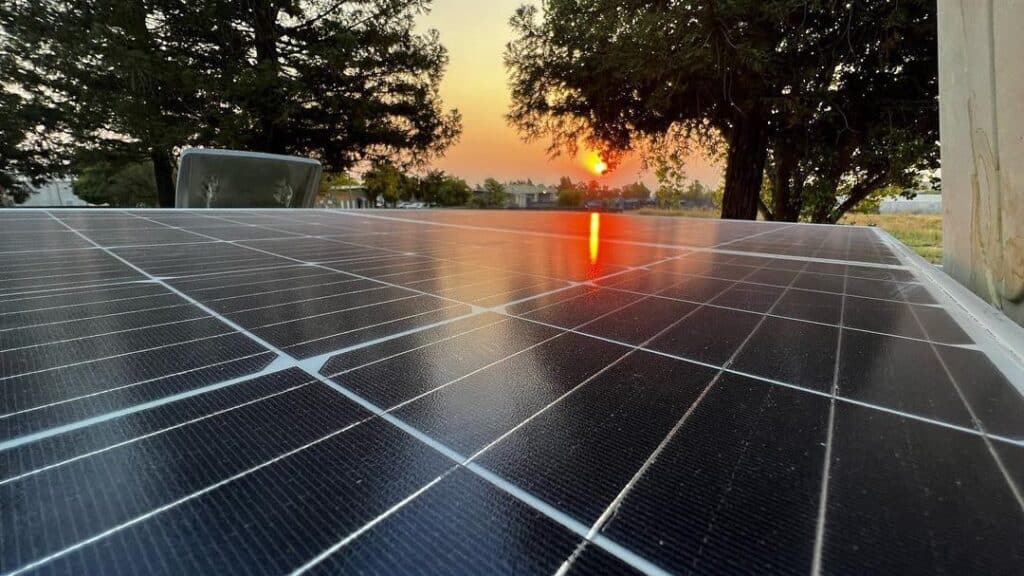
Monocrystalline and polycrystalline are the two most common types of photovoltaic (PV) cells that you’ll find when looking at van solar panels. CIGS is a type of thin-film PV cell used in some flexible panels.
Monocrystalline Solar Panels
Monocrystalline solar panels are the most efficient of any solar panel, so you get more solar power output in a smaller space. This efficiency is important when you’re working with the limited roof space of a camper van.
Mono panels feature solar cells made from a single silicon crystal (hence mono-crystalline), allowing the electrons more freedom to move around, which increases efficiency.
The downside is that mono panels are a bit more expensive to produce (and buy). However, the cost difference isn’t enough to make a huge dent in your wallet.
Polycrystalline Solar Panels
Polycrystalline solar panels are made by mixing multiple silicon crystals together in a single PV cell, which doesn’t give the electrons as much freedom of movement. As a result, polycrystalline panels are about 15%-20% less efficient than mono panels.
The lower efficiency of polycrystalline panels means you need more surface area to get the same amount of solar power. This isn’t a big deal in a house with tons of roof space, but it can become a problem when you’re trying to squeeze solar, a ventilation fan, and a storage box onto the roof of your short wheelbase Ford Transit camper.
That said, polycrystalline panels are cheaper, but not so much that you’ll feel the difference in a small camper van solar system.
Bottom Line: Monocrystalline solar panels are more efficient and take up less space for the same amount of solar output. Most of the best solar panels for van life are monocrystalline, and that’s what we recommend getting for your van conversion.
CIGS Flexible Solar Panels
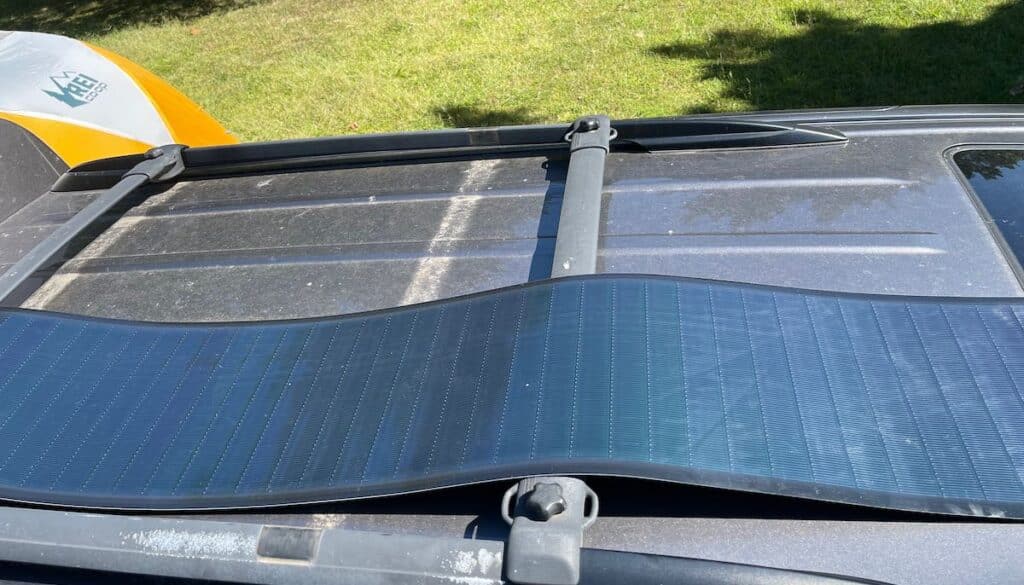
CIGS solar panels are a type of thin-film solar panel companies are marketing towards van lifers and RVers. Here’s why they’re interesting:
- CIGS panels are ridiculously flexible and more durable than silicon-based flexible panels. For example, BougeRV’s CIGS panel can bend a full 360-degrees, whereas Renogy’s flexible mono panel can only bend a maximum of 248-degrees. (Does this actually matter for van life solar? Probably not).
- They’re more sensitive to light, so they can produce more electricity in shade and low light environments.
- They’re slightly more efficient than flexible mono panels (BougeRV’s CIGS panels are 16% efficient vs 14.9% for Renogy’s flexible mono panels).
However, they are much more expensive. BougeRV’s CIGS panels are almost double the cost of Renogy’s flexible camper van solar panels, and close to triple the cost of rigid monocrystalline panels.
CIGS panels are an interesting option to keep an eye on as the technology develops. But until they drop in price, the cost is tough to justify vs standard monocrystalline panels.
Fun Fact: CIGS stands for Copper Indium Gallium Selenide and refers to the elements used to make the solar cells. Mono/poly panels use only silicon.
Form Factor: Rigid vs Flexible vs Portable
The two main solar panel form factors you’ll need to choose between are rigid and flexible. Each form factor has its advantages and disadvantages for van life, and which one you choose depends on your budget and installation needs.
In some cases, you could consider adding a portable solar panel onto your system. Portable panels provide additional charging flexibility, especially when paired with a portable power station.
Rigid Solar Panels
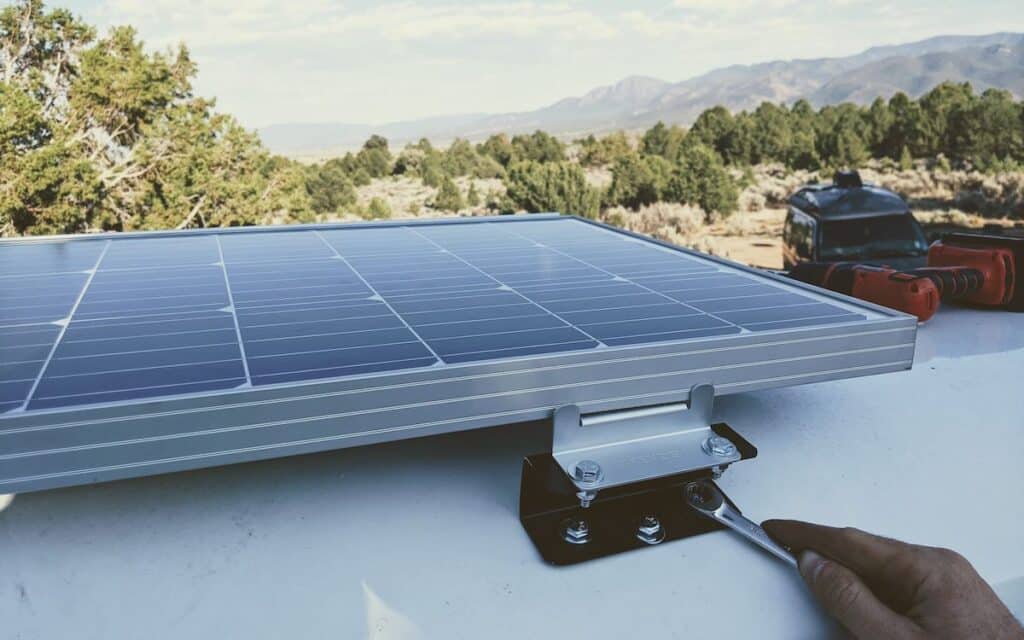
Rigid solar panels are the traditional solar panels with a rectangular aluminum frame. They are cheap and durable, and are a tried-and-true option for van solar panels. They can last a hell of a long time, and once you install these fixed solar panels on your van, you’ll basically never need to replace them.
Advantages of Rigid Panels
Rigid panels are especially good for installing on roof racks or on camper vans with flat roofs (like Sprinter vans, Ram Promasters, or Ford Transits). Putting these on curvy roofs gets a bit squirrly, and you may need to get creative with adding spacers for the mounting brackets, but it’s totally doable.
Rigid panels are the most efficient, the cheapest (at least 25% cheaper than the best flexible panels), and they should last every bit of the 25-year power output warranty that quality manufacturers like Renogy provide.
Pros
- Cheap and durable
- Much more efficient than other types
- Easy to mount to a roof rack
- Last a very long time
Disadvantages of Rigid Panels
While rigid camper solar panels are a great choice for van life, they also come with some significant downsides.
One of the most notable drawbacks is that you’ll need to drill holes into your van’s roof for the mounting hardware, unless you install solar panels on a roof rack. And the more holes you put into your van, the greater the risk of potential leaks. You’re also limited in your installation options because they won’t conform to curved surfaces like wonky van roofs or storage boxes.
Rigid panels are quite a bit heavier than flexible panels. For example, Renogy’s 100W mono panel weighs more than 14 lbs, whereas their 100W flexible panel weighs a touch over 4 lbs.
And, rigid solar panels are more obvious than flexible solar panels, which can make it harder to stealth camp in cities. (However, most camper vans stand out enough even without solar, and you can conceal rigid panels with a roof rack).
Cons
- May need to drill holes in your van’s roof
- Fewer mounting options
- Heavier weight
- More obvious, less stealthy
Flexible Solar Panels
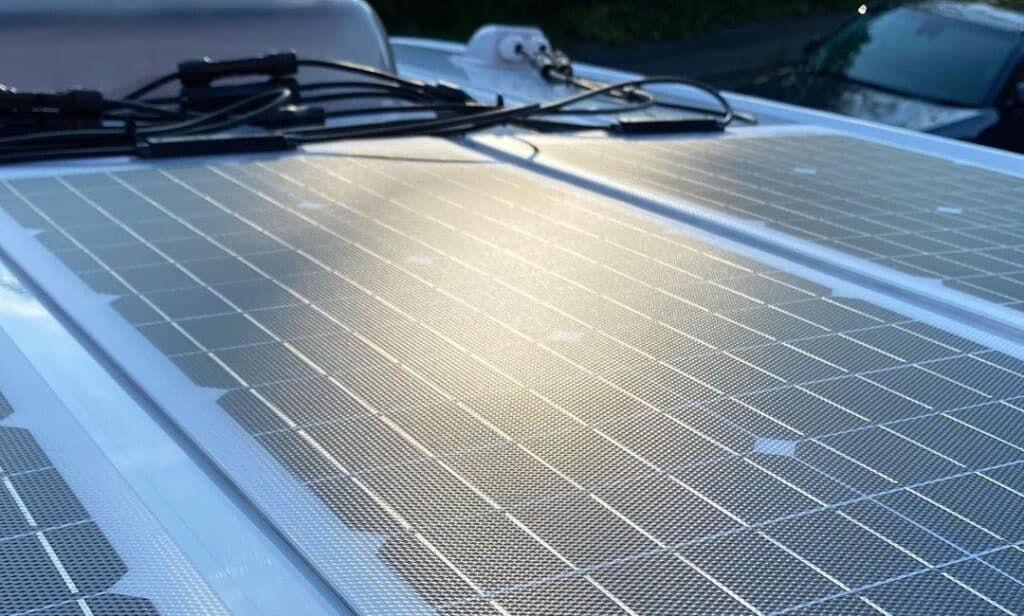
Flexible solar panels are super thin panels that can bend and flex, allowing you to install them on curved surfaces. (They are usually monocrystalline, but more CIGS panels are now hitting the market).
When we built out our first van back in 2016, flexible solar panels just weren’t there yet. They were too brittle, didn’t last very long, and Renogy even pulled theirs off the market entirely while they redesigned them from the ground up. But times have changed, and the best flexible panels now make sense for some camper van conversions.
Advantages of Flexible Panels
The advantage of flexible solar panels is that they’re much easier to install. If your van has a curved roof, they eliminate many mounting challenges since they can curve to follow your roof line. Renogy’s flexible mono panels can bend up to 248 degrees, which is plenty for campervan and RV solar systems.
You also won’t need to drill holes in your roof for mounting. Flexible panels stick right on with VHB tape, industrial-strength velcro, or industrial adhesive like Sikaflex 252 (you need an airflow gap to prevent overheating – using coroplast as a spacer works great).
Flexible solar panels are super lightweight – about 25% the weight of rigid solar panels.
Because they’re thin and sit right on your van’s roof, flexible solar panels are much less obvious, which could make them a better choice for “stealth” camper vans.
Important Note: Whatever flexible campervan solar panels you buy, make sure they’re coated with ETFE and not PTE. PTE coating yellows and degrades much faster, meaning your solar panel array won’t last as long. (All of Renogy’s panels have ETFE coating).
Pros
- Can conform to curved surfaces like van roofs
- Easier installation, no holes required
- Much lighter than rigid panels
- Lower profile, more stealthy
Disadvantages of Flexible Panels
Despite all these awesome advantages, flexible panels have some substantial shortcomings to consider.
Flexible camper van solar panels are not a budget choice by any means. They cost anywhere from 35% to 50% more than rigid panels up front. And you’ll have to replace them more often, making them pricier in the long run as well.
Although flexible panels may have power output warranties, that doesn’t mean the panel itself will last that long. These panels are prone to damage from overhanging branches hitting the top of your van, and they’re more susceptible to heat and sun damage. You might get 3-5 years out of a flexible panel mounted on the top of a van or RV, whereas a rigid panel can easily outlast your van.
Flexible camper solar panels are also less efficient than rigid panels. Renogy’s 100W mono flexible panel clocks in at 14.9% efficient, compared to 22% for their best rigid solar panel. This means you need to give up more roof space for the same panel output – although being able to bend the panel gives you more options that could offset this issue (however, bending the panels reduces their efficiency, so you might need more panels than you think).
Cons
- Higher upfront cost
- Much less durable, prone to scratching
- Lower efficiency, even lower when bent
- Shorter lifespan – expect to get 3-5 years out of them
Portable Solar Panels
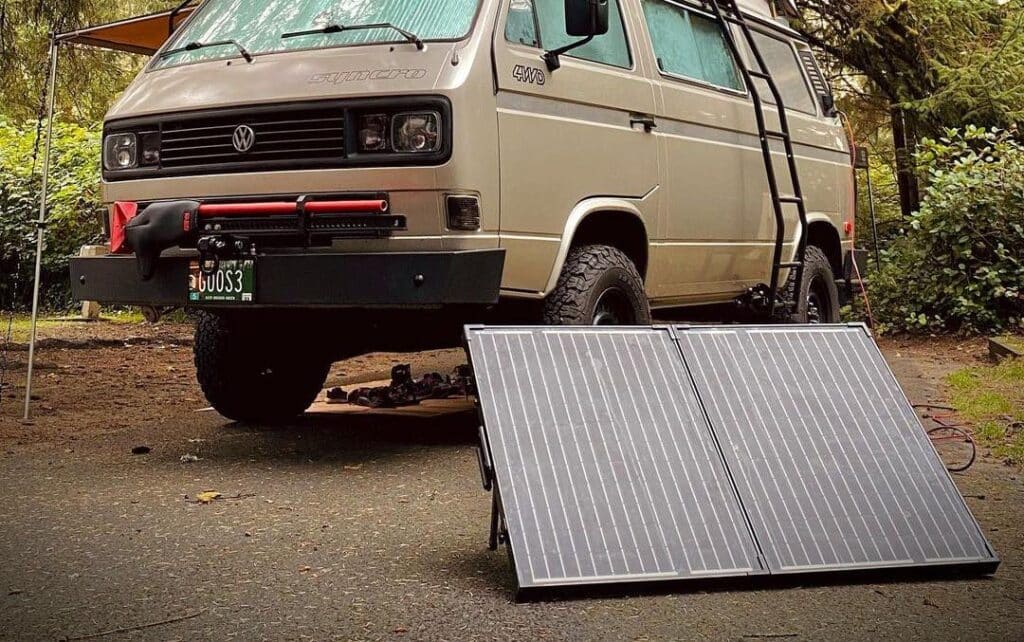
Both rigid and flexible panels are traditionally installed as fixed panels on the roof of your van. But if you want more flexibility with how and where you charge your solar power system, consider getting some portable solar panels.
Types of Portable Solar Panels
Portable panels come in two varieties:
- Solar suitcases are folding rigid panels that come with a case and handle for carrying. They’re just as heavy as a standard solar panel, but they’re cheaper and much more durable than other portable panels.
- Foldable solar panels feature monocrystalline solar cells on backing made of thick nylon. They are much lighter and more portable than solar suitcases, but they’re also flimsier, more expensive, and won’t last as long.
Which type should you go with? If you need ultimate portability and convenience, go with a set of lightweight foldable panels. If you don’t plan on straying too far from your van, a solar suitcase will suit you just fine and will last a lot longer.
Either way, portable solar panels share similar pros and cons compared to fixed panels.
Advantages of Portable Panels
Portable campervan solar panels are easily foldable, so you can quickly whip them out as needed. Paired with a portable power station, they allow you to take advantage of solar electricity anywhere – even away from your van. They’re also great options for supplemental charging, allowing you to park in the shade but still set up a solar panel in the sun, for example.
Most portable panels have similar efficiency ratings as the best rigid monocrystalline panels out there, making them far more efficient than the typical flexible solar panel.
Pros
- Lightweight and portable
- Fold up for easy storage
- Great for extra solar power when camped
- Some include USB ports for charging devices directly from the panel
Disadvantages of Portable Panels
There are two sides to every coin, and the portability of portable panels make them a poor choice to base your entire campervan solar system around.
Because these panels aren’t permanently mounted to your van, they can’t charge up your electrical system whenever you’re not camped. They won’t do anything for you while you’re driving, or running errands, or parked at a Walmart. Portable panels work best supplementing a fixed van solar setup vs being the main charging source.
(However, if you’re part-timing it or don’t want to install a full campervan solar system, portable panels and a power station are a great option – it all depends on your needs).
Portable solar panels are also expensive. You’re paying a lot for the convenience with these. And don’t expect the nylon foldable panels to last longer than a few years.
Pro tip: You can get the convenience of whipping out a solar suitcase without the extra cost by mounting a cheap rigid panel on a DIY kick stand frame made of PVC.
Cons
- The most expensive type of solar panel
- Can only charge when you’re camped
- Foldable panels not as durable
Are Solar Panel Kits Worth It?
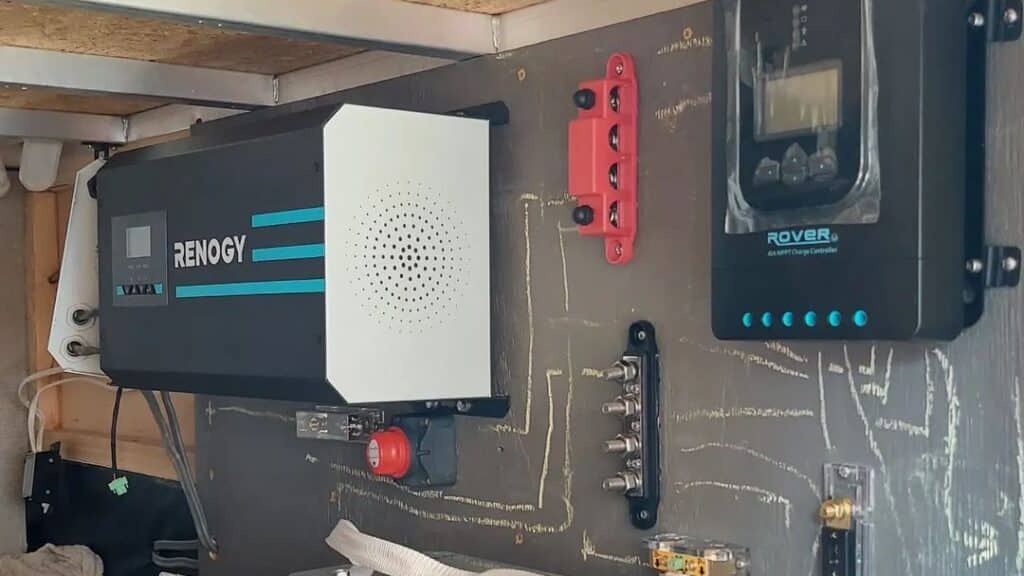
Solar kits bundle the main components you need to install solar power in your van, including panels, a charge controller, solar fuses, and wiring (you’ll still need a battery bank, an inverter, and other accessories like switches, bus bars, outlets, and more fuses).
We’re huge fans of solar panel kits. We installed a Renogy 400-Watt Premium Solar Kit in our first van, and have helped friends do the same. But solar kits are not for everyone.
Read More: 9 Best RV Solar Panel Kits That Are Actually Legit
Advantages of Solar Kits
Buying an RV solar panel kit is an excellent option for beginners to camper van solar setups since they take a lot of the guesswork out of choosing individual components. You don’t need to worry about deciding which solar charge controller to go with, or whether your camper van solar system can handle the input voltages, or what wiring or fuses you need for your solar panels – it’s all in the kit.
Kits can also help you save a bit of money. Let’s look at Renogy’s 400W Premium Solar Kit vs buying the components individually:
Renogy 400W Premium Solar Kit: $819.99
VS
Individual Components:
- (1) 40A Rover MPPT Charge Controller: $199.99
- (1) BT-1 Bluetooth Module: $39.99
- (4) 100W Mono Solar Panels: $519.96
- (1) Z-Bracket Set: $17.99
- (1) 10A Inline MC4 Fuse: $15.99
- (1) 40A ANL Fuse: $15.99
- (3) Solar Y Branch Connectors: $59.97
- (1) 20ft 10AWG MC4 Cable: $34.99
- (1) 2ft 8AWG Fuse Cable: $19.99
- (1) 8ft 8AWG Tray Cable: $36.99
Individual component total: $961.85
Premium Solar Kit Total: $819.99
Difference: Solar kit is $141.86 cheaper
As you can see, you’ll save well over $100 by getting the kit. (You can sometimes save even more when Renogy runs their frequent sales, so watch out for those deals).
Note: Renogy Premium Kits only come with the older BT-1 Bluetooth connector, which doesn’t work with some of their newer components. But even if you bought the newer BT-2 separately, you’d still save money with a kit.
Pros:
- No need to stress about picking every component
- They include all of what you need for installing fixed solar panels
- They’ll save you some money vs buying everything individually
Disadvantages of Solar Kits
The big issue with campervan solar panel kits is that they don’t give you as much flexibility in choosing your individual components. Kit options can be pretty basic, and more advanced components might not be available.
Many budget brands only offer kits with less-efficient PWM charge controllers, which we recommend staying away from (always go with an MPPT charge controller).
You’re also limited in the panels available. You won’t be able to choose different panel sizes, or 9BB vs 5BB, or flexible panels (Renogy offers a kit with flexible panels, but it doesn’t come with fuses or a BT-1).
If making all these specific choices is a priority for you, you’re better off buying the best solar panels and components individually – even if you end up paying more.
For ease of installation, most solar kits only go part of the way. They’ll help you get your campervan solar panels wired up, but you’ll still need to buy batteries, a 12V power inverter, wiring, and fuses to build out a full van life solar system.
However, Renogy’s Complete Solar Kits include batteries (either LiFePO4 or AGM), an inverter, and all the wiring you need. If you’re going with a kit to make things easier, this is the best option.
Cons:
- Can’t hyper-personalize your components
- More advanced components may not be available
- Not all kits come with everything you need
Bottom Line: When to Choose a Solar Kit
Choose a solar kit if:
- You’re don’t care about hyper-customizing every single component
- You want to save some money on a DIY solar system
- You’re new to installing solar panels and want something more “plug and play”
Maybe don’t go with a kit if:
- You’re an experienced solar installer and know what you need
- You want specific components that don’t come in a kit
- You like to hyper-customize your solar power setup with “the best” of everything
Important Solar Panel Specs to Consider
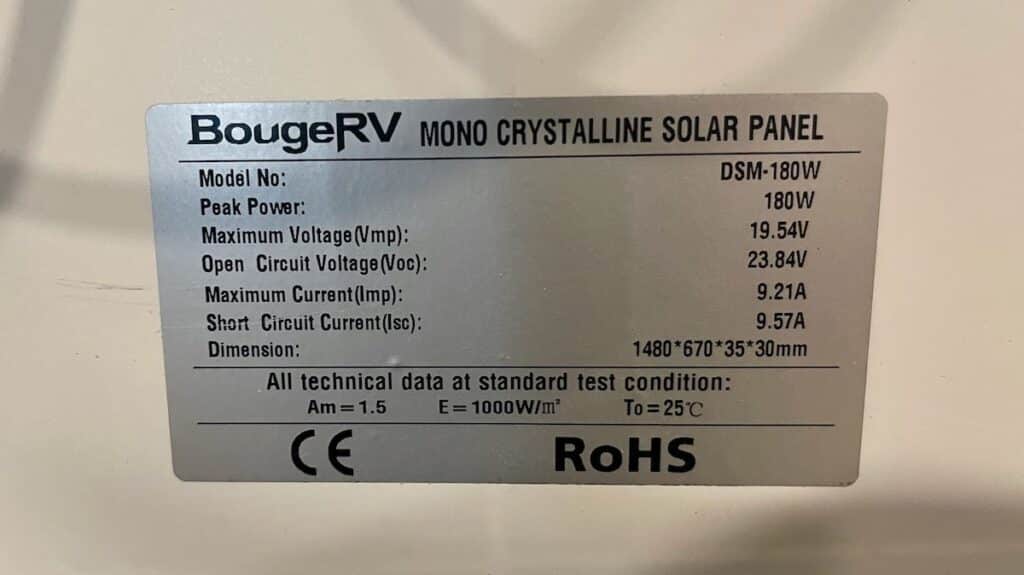
We’ve gone over the different solar panel form factors and types of solar cells, which should point you in the right direction for your van build.
But what should you actually look at when you’re comparing one solar panel vs another?
Ultimately, you’re looking for efficient, cost-effective van solar panels that will fulfill your energy needs. To figure that out, there are some important specs to consider, as well as some things you can calculate to help you directly compare solar panels (or use our helpful calculator below).
Here are the specs to look at when choosing your specific solar panels:
- Efficiency rating measures the ability of the solar panel to convert sunlight to electricity. Less efficient panels need more surface area to produce the same Wattage. So a 100W panel that’s 15% efficient will be larger than a 100W panel that’s 22% efficient.
- Open circuit Voltage (Voc) is the maximum Voltage produced by the solar panel, and you need to make sure this is right for your charge controller. Wiring solar panels in series adds Voltage, so 4x100W panels with a Voc of 24V will push 96V to your solar charge controller (4 x 24V = 96V). If your charge controller can only handle 80V max, then you need to consider wiring your panels in series-parallel (which lowers the Voltage output of the solar panels), or getting a charge controller that can accept a higher Voltage. You can also try to find panels with a lower Voc that will work with your existing charge controller.
- Dimensions. Sometimes this can really affect your choice if you’re trying to squeeze a bunch of stuff onto your roof in just the right configuration. Make sure the panels you’re considering will fit into your desired roof layout.
- Warranty. Check out the warranty and make sure you’re comfortable with it. For example, Renogy offers a 5-year warranty on manufacturer defects, and a 25-year warranty on solar output. Cheaper brands may offer only short-term limited warranties, which might save you a little upfront but could be a gamble if something stops working down the road.
- Cost per Watt. You’ll need to calculate this one, but it allows you to compare the cost of different sized panels. Take the price of the solar panel and divide it by the Wattage. Example: a 100-Watt panel for $112 ( $112 / 100 = $1.12/Watt) is cheaper per Watt than a 200-Watt panel for $239 ($239 / 200 = $1.195 per Watt).
Solar Panel Cost/Watt Calculator
What Size Solar Panels? Many Smaller Panels vs Fewer Bigger Panels
Solar panels come in various sizes, and you may wonder what size panel you should get for your van solar setup. If you’re building, say, a 400W system, should you go with 4 x 100W panels or 2 x 200W panels?
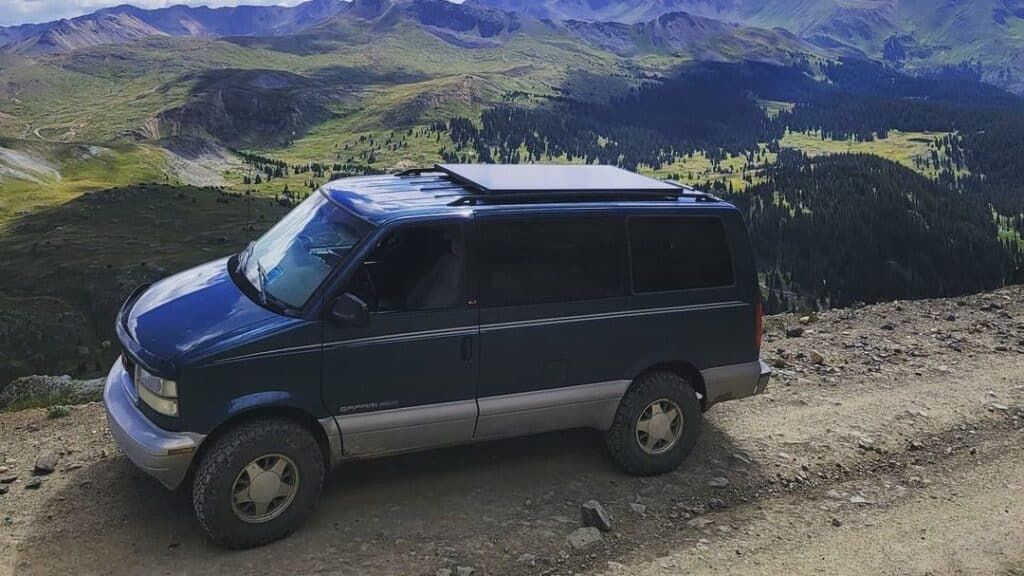
To answer this question, you need to consider your roof layout, wiring needs, and overall system size.
Think about your roof layout.
- Larger panels are more space efficient because you need to add spacing between smaller panels. This means that you could squeeze more solar capacity out of your roof space with larger panels.
- Smaller panels can give you some additional flexibility with placement, allowing you to fit more panels on your roof Tetris-style. This is why it’s a good idea to design your roof layout and look at the dimensions of the solar panels you’re considering.
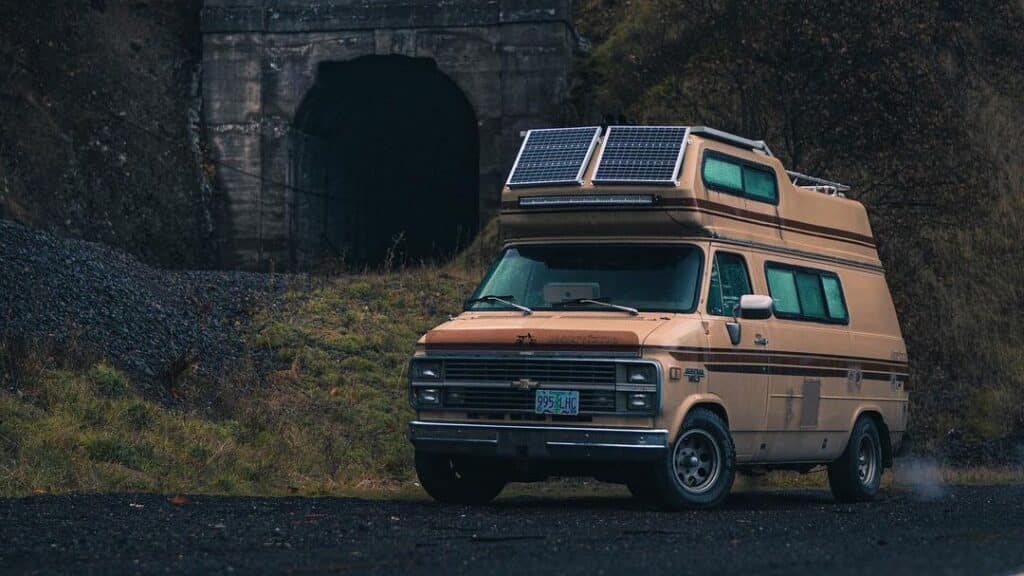
Also think about installation and wiring solar panels.
- Larger panels are simpler to install because they require fewer holes and fewer wires to connect. However, their bigger size makes them heavier and more difficult to handle.
- Since there are more of them, smaller panels are more complex to install. You’ll need to put more holes in your roof, and you’ll need additional fuses and wiring connectors. However, you’ll have more flexibility for wiring schemes, including being able to employ series-parallel wiring.
- Check your Voltages. This is super important. Make sure the open circuit Voltage (Voc) of your panels doesn’t exceed the maximum input Voltage of your charge controller. Two larger panels wired in series will have a lower combined Voc than four smaller panels. If you need a lower Voltage to stay compatible with your charge controller, larger panels are the way to go. However, if you’re shooting for higher Voltages then it will be easier to get there with smaller panels in series.
If you’re on the hunt for a van solar kit, your options depend on what’s available in kit form.
Read More: Should You Wire Your Solar Panels In Series Or Parallel?
Bottom Line: Larger panels are simpler and more space efficient. However, smaller panels add flexibility with wiring and roof layout.
9BB vs 5BB Mono Panels
If you’ve been researching vanlife solar power, you’ve probably seen the terms 9BB and 5BB being thrown around. What do these mean, and is 9BB really that much better?
“BB” refers to the number of bus bars that connect the individual solar cells. If you look at a mono solar panel, you’ll see several silver lines running vertically between the cells – these are the bus bars. 5BB panels have five bus bars, whereas 9BB panels have – you guessed it – nine.
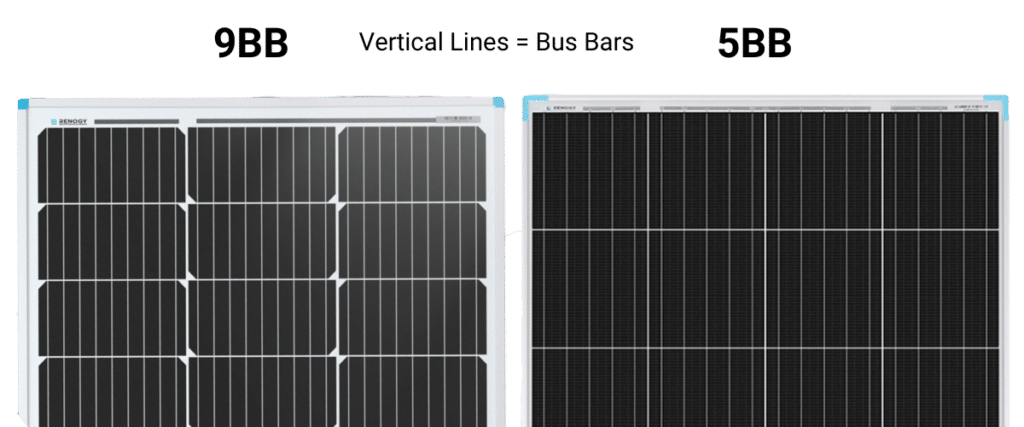
More bus bars means less power loss as electricity conducts through the solar panel, which translates into higher efficiency. Partial shading is less of an issue with 9BB panels, and tilt angle has less of an effect on power output. The added bus bars also contribute to greater durability and longevity.
We directly compared BougeRV’s 180W 9BB panels with their 180W 5BB panels (both discontinued). In our testing, the 9BB panels produced 15%-20% more Wattage than the 5BB panels when partially shaded and when laying flat (both panels produced the same Wattage when tilted towards the sun).
When you’re traveling in a van, your solar panels will be flat on your roof, and they’ll be partially shaded at times. Going with panels that see less power loss in these situations allows you to squeeze the most Wattage out of your roof space in the most situations.
Bottom Line: 9BB panels are less affected by partial shading and poor positioning. We think the extra power in suboptimal conditions is worth the small increase in cost.
Best Solar Panels for Van Life (of all types)
This high efficiency 9BB solar panel is less affected by shading and tilting, so you can squeeze the most power out of your van's roof space. Our top recommended solar panel.
Enter discount code Gnomad for 16% off at Bougerv.com
Cost per Watt: $1.40 | Weight: 22.93 lbs | Efficiency: 22.8% | Size: 54.72″ x 27.8″ x 1.38″ (1537 in²) | Open-circuit Voltage: 21.62V | Warranty: 5-years (materials) / 25 years (power output)
BougeRV’s 200W 9BB solar panels take the top spot in our list of the best campervan solar panels. They performed well in our testing, and we were blown away by how much better they did compared to older 5BB panels. We’re currently rocking these panels in our solar setup.
200W is a a great size – not too big to be unwieldy, but big enough to simplify installation. Two of these panels gets you 400W of solar, which is enough for most van life electrical systems. If you need more, it’s easy to size up to 600W or even 800W, and these panels use up less roof space than the equivalent wattage in 100W panels.
At first glance, the cost-per-Watt on these panels looks higher than some other brands, but that’s only if you’re paying full price. BougeRV runs frequent sales on their website, so you can usually pick these up on the cheap (or use our coupon code Gnomad for a big discount any time).
BougeRV offers a solid warranty (5 years materials / 25 years power output) that matches other reputable brands. And BougeRV as a company has shown themselves to care a lot about becoming a reputable brand in the vanlife community. Both of these things bode well for after-sale support, which is super important when you’re buying products like this.
Shipping damage has sometimes been an issue in the past, so watch out for dented frames when they arrive (ours showed up in beat up boxes, and there were a few dents on the frame). This is an issue for many solar brands that ship via couriers like UPS and Fedex, and it typically does not affect performance.
BougeRV sells 9BB panels in other sizes for additional flexibility, but their 200W panels offer the best combination of price, performance, and size that we’ve seen.
Renogy 100W Mono Solar Panel (Compact Design)
100W 9BB solar panel at an affordable cost per Watt. From Renogy, one of the best van life solar brands. (This panel also appears in Renogy's solar kits).
Enter discount code Gnomad8 for 8% off at Renogy.com
Cost per Watt: $1.25 | Weight: 14.1 lbs | Efficiency: 22% | Size: 41.8″ x 20.9″ x 1.3″ (874 in²) | Open-circuit Voltage: 24.3V | Warranty: 5-years (materials) / 25 years (power output)
If you’re looking for 100W solar panels, look no further than these “compact design” panels from Renogy. These are the panels that come bundled in Renogy’s awesome solar kits, and they’re great standalone options as well.
Renogy’s 100W compact panels (make sure you get the ones that say “compact design”) are some of the cheapest 9BB panels on the market, and Renogy is well known as a reputable solar provider in the van life and RV space.
The solar cell efficiency rating of 22% is the highest among the rigid panels on this list. The open circuit voltage of 24.3V is also among the highest of all the solar panels, meaning that these 9BB panels can pump more voltage into your batteries for faster charging.
Cost-per-Watt is actually better than our top pick BougeRV panels, and you can get an additional 10% off using our discount code GnomadHome. Renogy panels are generally middle-of-the-pack in terms of cost – not the cheapest, but also not the most expensive – but they’re among the best in terms of performance.
So far, this is the only 9BB solar panel that Renogy offers, so if you want a different size we recommend checking out other manufacturers like BougeRV, Newpowa, or Rich Solar.
Renogy 100-Watt Flexible Solar Panel
High efficiency, ETFE-coated flexible panels that are super bendable and outperform alternatives. Also available in a 175W size.
Enter discount code Gnomad8 for 8% off at Renogy.com
Cost per Watt: $2.06 | Weight: 4.2 lbs | Efficiency: 14.9% | Size: 48″ x 21.6″ x 0.08″ (1037 in²) | Open-circuit Voltage: 22.5V | Warranty: 5-years (materials) / 25 years (power output)
If you want easy installation and stealth capabilities, flexible solar panels are a great option. And Renogy’s flexible solar panel is in a class of its own.
Unlike many cheaper brands, Renogy coats all of their flexible panels with ETFE, which is more durable and degrades less quickly than PTE. This means your panels will have higher power output for longer, which can have a big impact on your costs over time.
Although we list the 100W version here, Renogy also offers this panel in a 175W size to accommodate different system configurations.
Flexible camper van solar panels in general are more expensive and less durable than rigid fixed solar panels. If you’re dropping this kind of money on your solar setup, you want to trust you’re getting the best bang for your buck, and this panels from Renogy is easily the best flexible solar panel for your rig.
Quality 9BB solar panel at the lowest cost-per-Watt out there.
Also available in 200W and 220W sizes.
Enter discount code Gnomad10 for 10% off at Newpowa.com
Cost per Watt: $1.05 | Weight: 13.29 lbs | Efficiency: 21.3% | Size: 38.58″ x 20.87″ x 1.18″ (805 in²) | Open-circuit Voltage: 22.12V | Warranty: 2-year limited (materials) / 25 years (power output)
If you’re looking for the cheapest camper van solar panels, it’s tough to go wrong with Newpowa. This 100W mono solar panel is the lowest priced 9BB solar panel we’ve seen from a reliable brand, and it’s also one of the cheapest 100W panels around. This makes it the best campervan solar panel for van lifers on a tight budget.
The open circuit voltage of these panels isn’t quite as high as our top picks, and Newpowa’s warranty isn’t quite as robust. But if saving money is your main goal, these solar panels are the way to go.
If you’d rather get a larger size, Newpowa also offers 9BB panels in 200W and 220W sizes. On top of that, they sell a 100W compact design solar panel that’s essentially square-shaped, so you can cobble together any roof configuration from Newpowa products.
High quality portable solar panel that performs better than the off-brands at a better value than the big brands.
Cost per Watt: $2.66 | Weight: 12.57 lbs | Efficiency: 23.4% | Size: 18.5″ x 21″ (folded) / 65″ x 21″ (unfolded) (1365 in²) | Open-circuit Voltage: 24.4V | Warranty: 12 months
Name brand foldable solar panels are ridiculously expensive, whereas bargain off brand panels don’t perform as well. These Bluetti panels hit the sweet spot: top performing foldable panels from a name brand, at a (slightly) lower cost than competitors.
The efficiency, open-circuit voltage, and warranty are comparable to other foldable panels out there. The tri-fold design is particularly useful if you have limited storage space (Jackery’s 100W Solar Saga panels are bifold and take up more room).
These panels have a robust build quality and high power output that puts them among the best performing foldable panels. And even though these are 120W, they’re cheaper than many 100W foldable panels out there.
Renogy 400W Complete Solar Kit
Just about everything you need to wire solar in your van.
Unlike most kits, this one includes 200Ah of self-heating LiFePO4 batteries (or AGM), 2000W pure sine inverter, wiring, connectors, and fuses.
Enter discount code Gnomad8 for 8% off at Renogy.com
Includes: 4x100W Renogy Solar Panels (compact design) | 2 x 100W Self Heating LiFePO4 Batteries (or AGM) | 40A MPPT Charge Controller | 2000W Pure Sine Inverter | Bluetooth Module | Fuses, wiring, connectors, and mounting brackets
Renogy puts together some great solar kits with high quality components. And this kit actually comes with just about everything you need to install solar panels on your van – including batteries and an inverter.
This takes the guess work out of sizing your system, picking out proper wiring and fuses, and selecting components that will work together. If you just want everything you need for solar to arrive at your doorstep with the click of a button, get this kit.
The components bundled in this kit are high quality. This kit includes Renogy’s 9BB compact design panels that we recommend above, a 2000W pure sine inverter, Rover 40A MPPT charge controller, and 200Ah of batteries. You have the choice of either AGM batteries or self-heating LiFePO4 (LFP) batteries. AGM is cheaper, but we recommend going with the LFP batteries if you can swing it. Also included are fuses, wiring, and mounting brackets.
The 400W size is perfect for most van lifers – this is exactly how many Watts we had on our first van, and we had plenty of power on our journey.
This solar kit will save you time, frustration, and money on your solar setup (use our coupon code GnomadHome for an additional 10% off).
BougeRV 130W Mono Portable Solar Panel
Portable solar suitcase with a lightweight, sturdy frame and highly-efficient 9BB solar cells. Easy to set up when camped.
Enter coupon code Gnomad for 16% off at Bougerv.com
Cost per Watt: $2.15 / Weight: 12 lbs / Efficiency: 23.5% / Size: 21″ x 26.6″ x 2″ (folded) / 42″ x 26.6″ x 1″ (unfolded) (1117 in²) / Open-circuit Voltage: 22.4V
If you want the convenience of a foldable panel with the durability of a rigid aluminum frame panel, then this BougeRV 130W rigid mono portable solar panel is the best campervan solar panel for you. This solar suitcase easily unfolds for additional solar capacity while you’re camped, and packs down into a compact size for travel.
This BougeRV panel is the most affordable solar suitcase we’ve seen, and it doesn’t come bundled with a charge controller (which is totally unecessary if you’re plugging this into an existing system). The main downside is that these panels have PTE coating, which can yellow and degrade the power output over time faster that ETFE coating.
Alternatives to Consider
Renogy offers several solar products that are good alternatives to some of our top picks, although at this point most of their offerings are 5BB panels. The cost-per-Watt on their panels is in the midrange–not crazy expensive but also not super budget–and their panels are high quality with good warranties.
Rich Solar offers panels in several types and sizes. If you’re looking for rigid camper van panels, flexible monocrystalline panels or CIGS panels, 9BB panels, solar suitcases, polycrystalline panels, or even 24V panels, Rich Solar has you covered. Their Mega 100W Slim solar panel is longer and narrower than most 100W panels, which could be a suitable option if you need specific dimensions. However, their higher cost-per-Watt makes Rich Solar panels a more expensive choice than other brands.
Ecoflow makes some of the best portable power stations on the market, but they also make high quality solar panels to power them. The Ecoflow 220W Bifacial Portable Solar Panel is a top contender. Its bifacial design allows it to capture reflected light from the rear of the solar panel, and its cost is similar to other high quality portable panels. However, it’s a bit flimsy and it can be challenging to keep it standing in windy weather.
HQST is Renogy’s budget label. Their solar panel offerings are very similar – almost the same panels, in fact – and they cost less without the Renogy branding. If you’re only looking for solar panels, HQST is a good way to go. However, if you’re looking for a kit or a complete system, Renogy has a larger variety of products and some interesting Bluetooth integration options. And HQST coats their flexible panels in PTE, which degrades faster than ETFE (Renogy coats theirs with ETFE).
Jackery is best known for their power stations like the Explorer 1000 but they also make high quality Solar Saga foldable panels to go along with them. You can’t go wrong with these panels, but they’re expensive and the bi-fold design means they’re bulkier than foldable panels from other brands.
Solar Panel Discount Codes
To help you get the best deal on solar for your van or RV, we’ve negotiated coupon codes from some of our favorite solar panel brands.
(affordable)12V fridges, solar panels, batteries, power stations, accessories, and more.
Use discount code GNOMAD for 16% off at bougerv.com
Solar kits, inverters, DC-DC chargers, accessories, and more!
Our exclusive coupon code includes sales items and batteries. You won't find these discounts anywhere else.
Enter discount code Gnomad8 for 8% off at Renogy.com
Large and small solar kits, panels, inverters, batteries, and accessories.
Enter coupon code GNOMADHOME for 10% off at Richsolar.com
High-quality solar components at an affordable price.
Enter discount code GNOMAD10 for 10% off at Newpowa.com
Vanlife outfitter Unaka Gear Co sells all kinds of van conversion supplies, including top-of-the-line Victron solar components, as well as electrical wiring, tools, and connectors.
Enter discount code GNOMADHOME for 5% off at Unakagearco.com
Van Life Solar Panels FAQ
How many solar panels do you need for van life?
What size solar system you need for your van depends on your priorities and budget. We recommend 200W of solar at a bare minimum, but going with a 400W system gives you a lot more flexibility in what you can power.
You can get a handle on exactly how much solar you need by calculating your electricity usage, then designing the size of your solar setup based on that (our DIY vanlife electrical guide has detailed instructions for this). Alternatively, size your system based on your budget and plan your electrical usage around that.
How much does it cost to put solar panels on a van?
The cost of van life solar depends on the size of your system and the quality of your components. Larger systems are more expensive because you’ll need more solar panels and greater battery bank capacity. You can install a barebones 200W system with an AGM battery for as little as $400, whereas top-of-the-line systems with lithium batteries can cost $2,000 or more.
The type of solar panels and batteries you choose affects cost. Flexible panels are more expensive than rigid panels, and lithium batteries cost more than AGM batteries. You can always select components based on your budget to help control costs.
What kind of solar panels do I need for a van?
If you are mounting solar panels on the roof of your van, we recommend going with monocrystalline solar panels – either rigid or flexible panels will work. Rigid mono panels are cheaper and more durable, but they’re more difficult to mount and make your van stand out more. Flexible mono panels are more expensive and won’t last as long, but they’re also lighter and easier to conceal.
Are solar panels on a van worth it?
Putting solar on your van is absolutely worth it. A full solar system (or a solar generator power station) allows you to camp off grid indefinitely while still powering essential things like lights, a vent fan, and a 12V refrigerator. If you plan on making van life your full-time lifestyle, going solar is essential.
However, if you’re on a tight budget solar is not strictly necessary. If you have very basic electrical needs (i.e. charging your phone and running some lights) you can get by with a good battery paired with a DC-DC charger and a good inverter. A barebones setup like this allows you to get on the road with the basics, and you can always add solar down the road.

